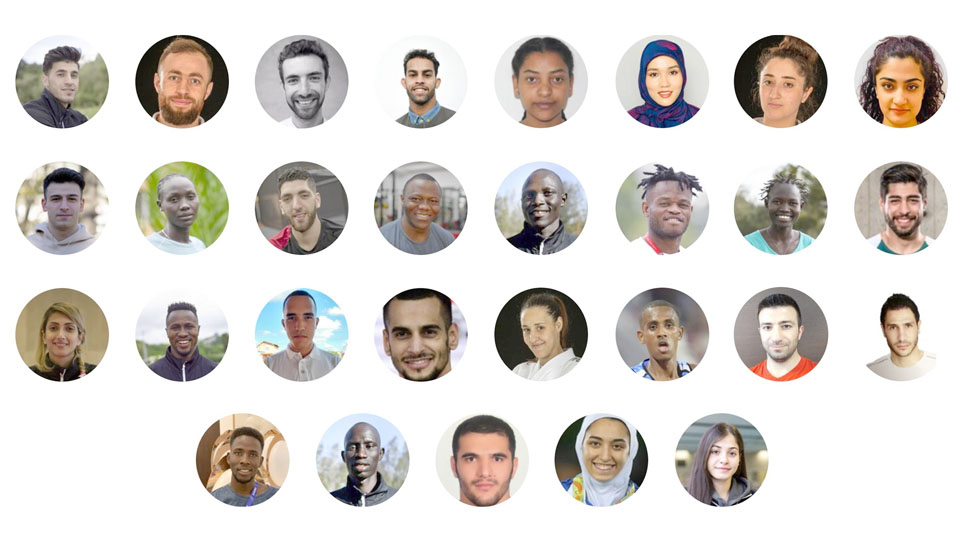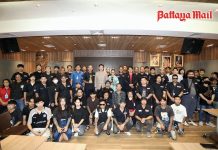
Twenty-nine athletes competing across 12 sports and from 13 host National Olympic Committees (NOCs) will be part of the IOC Refugee Olympic Team (EOR) Tokyo 2020. The Executive Board (EB) of the International Olympic Committee (IOC) today approved the composition of the team.
The athletes were selected from among the refugee athletes currently supported by the IOC through the Olympic Scholarships for Refugee Athletes programme. They will send a powerful message of solidarity and hope to the world this summer, bringing further awareness to the plight of over 80 million displaced people worldwide.
The 29 athletes met for the first time today in a virtual ceremony during which IOC President Thomas Bach officially announced their participation in the Games in Tokyo this summer.
Addressing the athletes, the IOC President said, “Congratulations to all of you. I speak on behalf of the entire Olympic Movement when I say that we cannot wait to meet you in person and to see you compete in Tokyo. When you, the IOC Refugee Olympic Team and the athletes from the National Olympic Committees from all over the globe, finally come together in Tokyo on 23 July, it will send a powerful message of solidarity, resilience and hope to the world. You are an integral part of our Olympic community, and we welcome you with open arms.”
UNHCR High Commissioner Filippo Grandi congratulated the athletes, saying, “I am thrilled to congratulate each of the athletes who have been named in the Refugee Olympic Team Tokyo 2020. They are an exceptional group of people who inspire the world. UNHCR is incredibly proud to support them as they compete at the Tokyo Olympic Games. Surviving war, persecution and the anxiety of exile already makes them extraordinary people, but the fact that they now also excel as athletes on the world stage fills me with immense pride. It shows what is possible when refugees are given the opportunity to make the most of their potential.”
The team will compete under the Olympic flag. At the Opening Ceremony on 23 July, the athletes will enter the stadium in second position immediately after Greece, sending a strong message of inclusion, and showing the world the strength of the human spirit.
Spotlight on the IOC Refugee Olympic Team Tokyo 2020
The selection of the IOC Refugee Olympic Team Tokyo 2020 was based on a number of criteria, including, first and foremost, each athlete’s sporting performance and their refugee status as confirmed by the UN Refugee Agency (UNHCR). Personal background, as well as a balanced representation in terms of sport, gender and regions, were also considered.
Like all teams at the Olympic Games, the IOC Refugee Olympic Team will have its own entourage to meet all the required technical needs of the athletes. Olympian and former marathon world record-holder Tegla Loroupe will be the team’s Chef de Mission, reprising her role from the Olympic Games Rio 2016, while Stephen Pattison from UNHCR and Olivier Niamkey from the IOC will act as the Deputy Chefs de Mission. They will lead a delegation of 20 coaches and 15 team officials, while Olympic Solidarity will cover travel and all other participation expenses for the team.
The full EOR* delegation will meet for the first time as a team at the Aspire Academy in Doha (Qatar) on 12 and 13 July for their Welcome Experience, before flying to Japan on 14 July. During the Games, the team will be hosted by Waseda University, which will provide accommodation and training facilities, before the athletes move to the Olympic Village for their respective competitions. Both of these training camps have been made possible due to the support of the NOCs of Qatar and Japan.
A strong legacy from Rio 2016
The first-ever IOC Refugee Olympic Team, consisting of 10 athletes, competed at the Olympic Games Rio 2016. The athletes captured the attention of the world through their inspirational journeys and performances. Six of those athletes – swimmer Yusra Mardini, judoka Popole Misenga and runners Anjelina Nadai Lohalith (1,500m), James Nyang Chiengjiek (800m), Paulo Amotun Lokoro (1,500m) and Rose Nathike Likonyen (800m) – will be part of the team again in Tokyo.
Following the success of the IOC Refugee Olympic Team Rio 2016, the IOC decided in 2018 that there would be an IOC Refugee Olympic Team Tokyo 2020. Olympic Solidarity was mandated to establish the conditions of participation and define the selection process for the team, in close collaboration with the UNHCR, NOCs and International Federations (IFs).
This led to the creation of the Olympic Scholarships for Refugee Athletes programme, which awarded grants to 56 eligible athletes, providing them with the financial support that enabled them to train for the Games while continuing their sporting career and building for their future. The grants were extended for a further year following the postponement of Tokyo 2020, bringing the total investment by Olympic Solidarity in support of refugee Olympic scholarship-holders preparing for the Olympic Games to USD 2 million since Rio 2016.
The historic participation of the IOC Refugee Olympic Team at the Olympic Games Rio 2016 also prompted the creation of the Olympic Refuge Foundation (ORF) in September 2017, as the next chapter in the IOC’s long-term commitment to supporting the protection, development and empowerment of displaced young people through sport 365 days a year across the globe.
Working closely with UNHCR, the IOC’s partner for the last 25 years, and in cooperation with the Olympic Movement, international organisations, the private sector, including Worldwide Olympic Partner Airbnb, non-governmental organisations and other foundations, the ORF has supported 12 programmes in eight countries (Colombia, Democratic Republic of Congo, Jordan, Kenya, Mexico, Rwanda, Turkey and Uganda), with new initiatives to be launched this year in Colombia and France. As a result, 200,000 young people are currently benefiting from sports programmes designed to improve their well-being and social inclusion. The goal of the ORF is to provide one million young people affected by displacement with access to sport by 2024.
This strong grassroots impact goes hand-in-hand with the sense of solidarity and support generated from seeing the world’s top refugee athletes compete at the Olympic Games.
Ongoing support beyond Tokyo
The IOC will continue to help the refugee athletes not on the Tokyo team, and support the members of the team after the Games through various Olympic Solidarity programmes, including support for athlete career transition.
The athletes have already been given access to the educational materials available on Athlete365, allowing them to learn about crucial topics such as anti-doping, safe sport and the prevention of competition manipulation.
To supplement their scholarship, athletes have the opportunity to earn extra income through Airbnb Online Experiences. Delivered by the IOC in partnership with Airbnb, Refugee Athlete Online Experiences give athletes the chance to earn money by sharing their skills and passion for sport with the world. A number of the refugee athletes have hosted these interactive activities, from inspirational lessons in resilience, to self-defence and workout classes.
Thanks to the ongoing support of the IOC and Olympic Solidarity, refugee athletes will also have the opportunity to train for future editions of the Olympic Games. As a result of recommendation 11 of the IOC’s roadmap Olympic Agenda 2020+5, a Refugee Olympic Team is planned for both the Olympic Games Paris 2024 and the Youth Olympic Games Dakar 2026.
*The IOC Refugee Olympic Team will compete in Tokyo under the French acronym EOR, which stands for Equipe Olympique des Réfugiés.

 |
 |
 |





